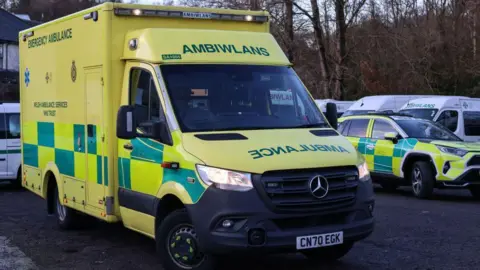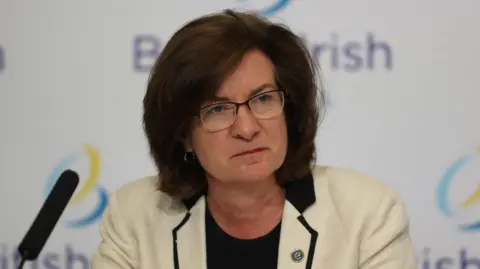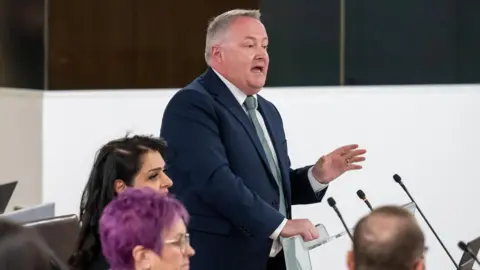Many dying because of ambulance delays - coroner
 Getty Images
Getty ImagesMany patients are dying in Wales because of long waits for ambulances, a senior coroner has said.
Graeme Hughes made the comments in a report to the First Minister Eluned Morgan, following an inquest into the death of an 89-year-old woman who waited 14 hours after a fall.
He said more could die unless something is done to reduce the time it takes to handover patients from paramedics to hospitals.
The Welsh Conservative Senedd leader, Darren Millar, said it was "unprecedented" for a coroner to write directly to the first minister. Morgan said the advice of coroners was taken "very seriously".
She said the problem lay in delays transferring people from hospital into social care.
The senior coroner for South Wales Central raised his concerns in a "prevention of future deaths" report - one of a large number that have been sent to health boards and the Welsh government by coroners in recent years.
At least seven since May 2024 have been issued which raise concerns over ambulance response times, including several to Morgan when she was health minister.
Other reports in 2025 included the case of a man who died from bleeding from his wrist after a fall on glass, and a woman who died of sepsis. Both those incidents involved very long waits for a paramedic.
The coroner told the first minister that the "prevalence and extent of such delays has become beyond intolerable and is leading to many acutely unwell patients in the community waiting for such prolonged periods for emergency care, dying directly and indirectly as a consequence".
His comments followed his investigation into the death of Valerie Hill, who died at the Royal Glamorgan Hospital in March 2022 days after a fall at her care home in Treharris, near Merthyr Tydfil.
Listing pneumonia and a fall leading to a fracture as causes of her death, the inquest learned that Mrs Hill had been lying on a floor for over 14 hours while waiting for an ambulance to attend.
He said a "lack of risk assessments" at her care home may have meant precautions were not taken to prevent further falls.
But the coroner added that long ambulance handover times across Cwm Taf Morgannwg health board had possibly contributed to the 14 hour wait, which exacerbated known medical conditions.
He told the first minister "in the three years since Valerie's death you have received multiple prevention of future death reports from myself and fellow coroner's in Wales highlighting the devastating outcomes attributable to delays in conveying acutely unwell patients to hospital/ambulance handover delays".
"Those risks continue," he said.
He quoted the first minister's response to an earlier report, saying she had set a "priority" for an improvement of "patient flow".
The coroner said this had not led "to any discernible improvement".
He said the health board itself had told the inquest its performance was "not the worst in Wales".
 PA Media
PA MediaThere has been a deterioration in amber response times - serious but not immediately life-threatening calls – from a median wait of around 50 minutes on average in winter 2019 to more than 150 minutes last winter.
The number of "lost hours" due to handover delays at hospitals has also increased from around 6000-8000 for some months in 2018 to 30,000 hours at peak months last year.
The figure for March 2022 at the time of Mrs Hill's fall was over 24,000 hours.
'Could happen again'
NHS Wales deputy chief executive Nick Wood gave evidence at the inquest, where he was asked if a situation akin to that which Valerie Hill faced "could happen again today".
"He accepted that that was a fair conclusion and that the same risks remain in the system," the coroner wrote.
The Welsh Ambulance Service Trust has continued to expect a 15 minute handover time for patients, although the Welsh government relaxed its guidance last year.
"I received evidence that hospitals across Wales are only delivering this expectation around 10-20% of the time," the coroner wrote.
NHS Wales chief executive Judith Padget wrote to Eluned Morgan in February 2022 over her "acute concerns", as the coroner put it, with delayed ambulance handovers.
"A health and social care system leadership response is required to current operational pressures on a par to the Covid-19 response," she said.
Mr Wood said in his evidence that the response had not been on a par with Covid.
'Stop moaning'
In Cardiff Bay on Tuesday, Welsh Conservative Senedd leader Darren Millar said of the 25 prevention of future death reports issued since last August, five were directly linked to ambulance delays.
Morgan said the reports were taken "extremely seriously", and that there had been a "huge amount of work done to try and move forward with a programme of how we can speed up that response".
"We know that part of the problem is delayed transfers of care," she said. "If you want to fix the NHS, you have to make sure that you fix care."
She went on: "So, stop moaning, because that's the way that you actually fix things."
Millar took objection to the moaning remark, calling it "glib", before, telling the Senedd that the report into the death of Valerie Hill was "unprecedented".
He said that Padget had "effectively" asked Morgan to "declare a health emergency".
"You chose not to declare that health emergency," he said.
"Under no circumstances have I said that the coroner is moaning," Morgan quickly clarified.
She said she did not want to talk about individual cases but added that there had been "massive investment in support for care homes".
There was "never a request by the director-general of the NHS in Wales to declare an emergency", Morgan added.
Later, in response to Plaid's Heledd Fychan, Morgan said £30m was being allocated to councils to boost investment in community based social care.
 Senedd Cymru
Senedd CymruIn another report to Eluned Morgan, when she was minister for health in 2024, concerns were raised over the death of a woman from sepsis after a long ambulance wait.
Lynda Blackmore waited for 13 hours despite having become "acutely unwell" and having been seen by her GP with a bruised, swollen leg. An urgent ambulance was requested for "specialist vascular treatment".
The delay was caused by a "combination of miscategorization of the response, resources availability and hospital handover delays".
The patient was diagnosed with sepsis on arrival to hospital. The coroner, Mr Hughes, found the delay was likely to have contributed to her death.
In a further report, a coroner raised concerns about the death of a man who cut a vein in his right wrist after falling on broken glass.
Peter Parker told 999 that blood was pumping out. The call was classed as "amber one", rather than the most important class of red.
A rapid response vehicle vehicle, with the assistance of the police, gained access to his home around nine and a half hours after the ambulance was requested. He was pronounced dead at the scene.
The coroner said he was concerned "that the response time in this case was beyond the expected survivability of such an injury".
In response to the inquest into Valerie Hill's death, a spokesperson for Cwm Taf Morgannwg University Health Board said: "We extend our sincere condolences to the family of Valerie Hill during this extremely difficult time."
Spokesperson added: "We are fully committed to learning from this case, which will help inform improvements in our services for the future."
The Welsh government said: "We have been clear with health boards about our expectations in terms of responding to these reports and about improving ambulance handovers.
"We have established a national, clinically-led taskforce to support these efforts."
Analysis
By Gareth Lewis, BBC Wales political editor
These reports make grim reading, but for the Welsh Conservatives they also make a political point.
They would declare a 'health emergency' if they run the government after next year's Senedd election and they want to show a pattern of a lack of improvement and continued failures on Welsh Labour's watch.
They are also keen to link that to First Minister Eluned Morgan, who received some of these reports during her time as health minister and now again in her current role.
Earlier this month the outgoing head of the Welsh ambulance service said that improvements were being made and that Welsh government was listening.
But he also acknowledged that hundreds of patients of patients were coming to avoidable harm every month because ambulances were forced to wait outside crowded emergency departments.
'System-wide issue'
Plaid Cymru's Heledd Fychan said: "The coroner's words should show the first minister the stark reality of the current situation.
"With these delays leading to life-threatening situations, even death as in Valerie Hill's case, myself and individuals in my region need to hear from the first minister not what's happened, but what the Welsh government will do now, so that families like Valerie's family won't have to suffer."
Jane Dodds, leader of the Welsh Liberal Democrats, said: "These tragic deaths lay bare a broken system, where ambulance delays are the direct result of gridlocked hospitals and an overstretched, under-prioritised social care sector."
The Welsh Ambulance Service's Liam Williams said ambulance delays "are a symptom of a much broader, system-wide issue and we're grateful to coroners for their thorough exploration of the issues".
"Coroners have, over a number of years, made recommendations in respect of the NHS in Wales – including the ambulance service – which we take extremely seriously.
"At the centre of events like these is our inability to respond to our patients as promptly as we would like.
"While it's never easy receiving a Prevention of Future Deaths report from coroners, it's important that we reflect on how we can accelerate our improvements and also collaborate further with health and social care partners to help deliver meaningful and lasting change and provide patients the care that they deserve."
